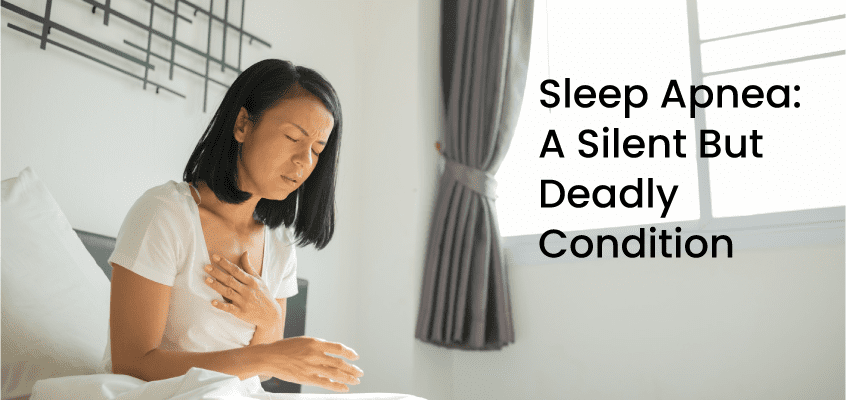What is sleep apnea?
Sleep apnea is a pervasive disorder. It causes a person’s breathing to halt while sleeping, and as a result, their blood oxygen levels significantly drop. A person with sleep apnea will feel tired during the day, even after sleeping for several hours. Over time, sleep apnea can lead to several complications, such as depression, high blood pressure, and heart disease.
Sleep apnea can be of three types:
- Obstructive sleep apnea: In this type of apnea, the throat’s soft tissue collapses during sleep. As a result, the upper airway gets wholly or partially blocked. The diaphragm and the chest muscles then work harder to open the airway. A person with obstructive sleep apnea often breathes with loud gasps. It lowers sleep quality and reduces the flow of oxygen to vital organs.
- Central sleep apnea occurs when the central nervous system fails to function and there is no airway blockage. Instead, the brain cannot stimulate the respiratory muscles due to problems in the respiratory control centre. Central sleep apnea usually happens in people with heart, lung, kidney, or neuromuscular diseases.
- Complex sleep apnea syndrome occurs when someone has both obstructive and central sleep apnea.
The dangers of sleep apnea
Sleep apnea can happen to anyone. However, a few factors make some people more susceptible to this disorder:
- Obesity: People who are overweight have an increased risk of developing sleep apnea as fat deposits around the airway can cause obstructions in breathing.
- Genetic conditions: Some people are born with a narrower throat or airway. A deviated septum and frequently blocked nose can also obstruct breathing. Tonsils or adenoids can also enlarge and block the airway, causing sleep apnea.
- Gender: Several studies have shown that older men are two or three times more likely to develop sleep apnea than their counterparts.
- Smoking: People who smoke are at a greater risk of developing sleep apnea than non-smokers. Smoking causes fluid retention and inflammation in the upper airway and makes it difficult to breathe normally.
- Medical conditions: People with pre-existing medical conditions are at a greater risk of developing sleep apnea. High blood pressure, lung diseases, type 2 diabetes, and heart disorders increase the probability of developing breathing problems.
How to identify sleep apnea
Mild symptoms of sleep apnea usually go unnoticed. Some noticeable symptoms of obstructive and central sleep apnea include:
- Loud snoring while sleeping
- Waking up with a dry mouth
- Gasping for air while sleeping
- Persistent morning headaches
- Feeling sleepy during the daytime
- Difficulty in falling asleep at night
- Restlessness while sleeping
- Irritability, trouble concentrating, and forgetfulness
A medical professional can help diagnose sleep apnea. The first step is a detailed evaluation, where the doctor will ask questions to rule out other possible causes of sleep disturbance.
Next, the doctor may recommend an overnight sleep study. In this study, the person sleeps overnight in a sleep laboratory, and different parameters are measured using specialised equipment. Doctors record the patient’s brain waves, airflow, breathing patterns, leg and eye movements, heart rhythm, and oxygen levels.
The sleep specialist then analyses this data. The doctor observes the number of times the regular breathing pattern disrupts during sleep. Based on this, they can diagnose the person with a mild, moderate, or severe case of sleep apnea.
Treating sleep apnea
Doctors prescribe treatments for sleep apnea based on the severity of the condition. Lifestyle changes can usually cure mild cases.
Maintaining a healthy weight can go a long way in treating sleep apnea symptoms. In addition, doctors advise people with sinus issues or nasal congestion to seek help if they have a case of sleep apnea, as it will help improve airflow and make breathing easier. Also, smoking is one of the major culprits that cause respiratory issues, so this unhealthy habit is the cause to bring sleep apnea in check.
The doctor can recommend additional treatments to manage breathing obstructions in moderate or severe sleep apnea cases. Positive airway pressure (PAP) therapy is the preferred mechanical therapy for people with mild to severe cases of sleep apnea. In this therapy, the machine sends air pressure through the mask worn by the patient, ensuring the airway tissues do not collapse and airflow is maintained as long as the device is in use.
Another line of treatment is surgery. Doctors can recommend surgery for people with a deviated nasal septum or other severe malformed tissues obstructing airflow. Surgery is often seen as a last resort when the individual does not respond to conventional treatment plans.
Sleep apnea and the quality of life
Obstructive sleep apnea can negatively affect a person’s quality of life. The lack of a good night’s sleep can lead to tiredness and irritability. Over an extended period, sleep apnea can lead to heart disease and high blood pressure and significantly diminish a person’s quality of life. Sleep apnea can even decrease life expectancy by several years.
People with sleep apnea must seek help. A qualified medical professional can choose the best treatment plan to manage their symptoms. Proper management of sleep apnea can go a long way in helping individuals lead healthy lifestyles.
Conclusion
Sleep apnea is a fairly common sleeping disorder—the thought of not breathing while sleeping scares many people. But don’t be intimidated by this. A doctor can help diagnose and figure out the best treatment plan for sleep apnea. All we need to do is be vigilant and take a few precautions. Maintaining a healthy lifestyle can reduce the risks and diminish the progression of sleep apnea. Make sure to eat a proper diet and follow an exercise regimen. Sleep apnea cannot stop us from living life to the fullest.





